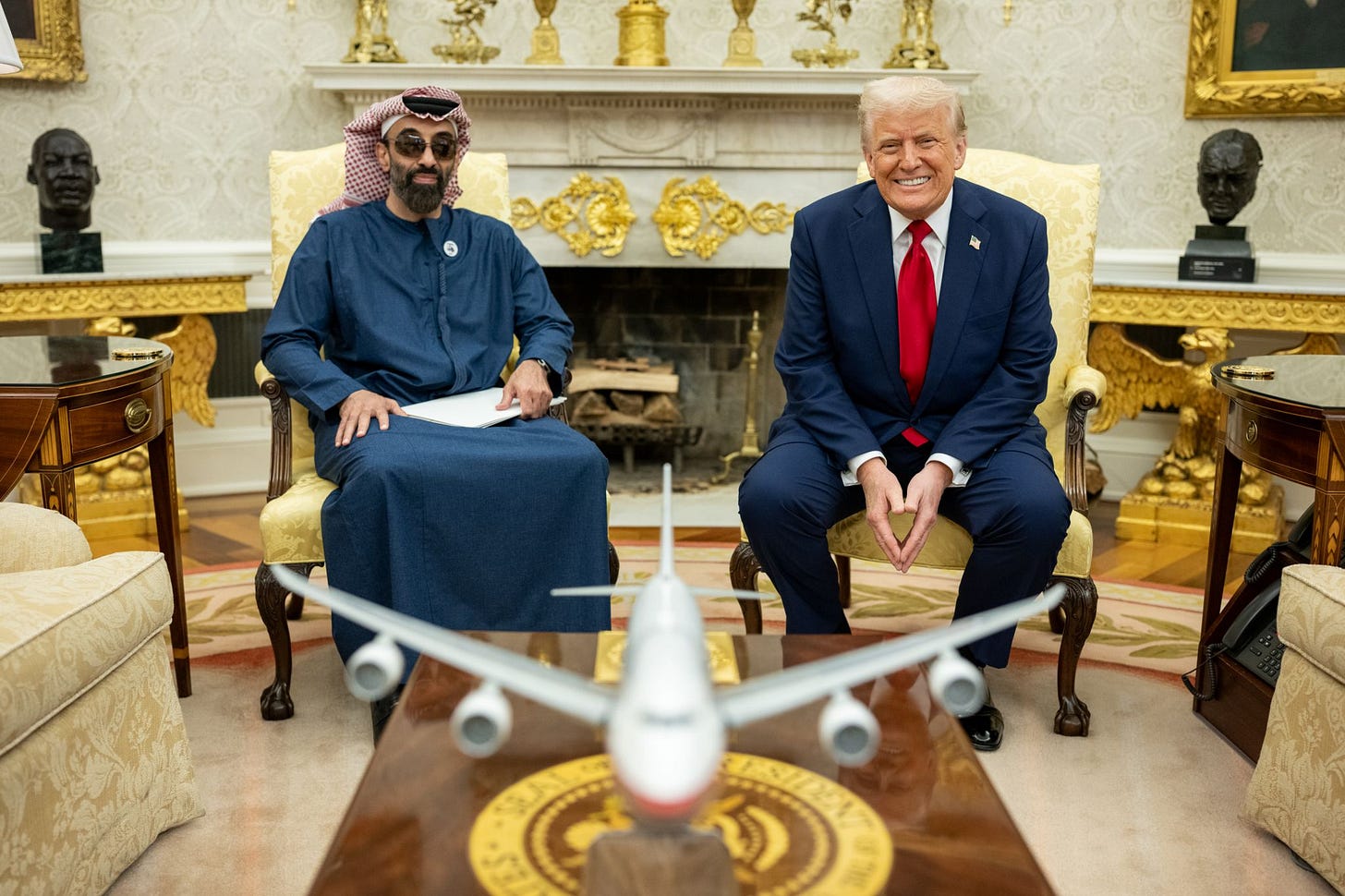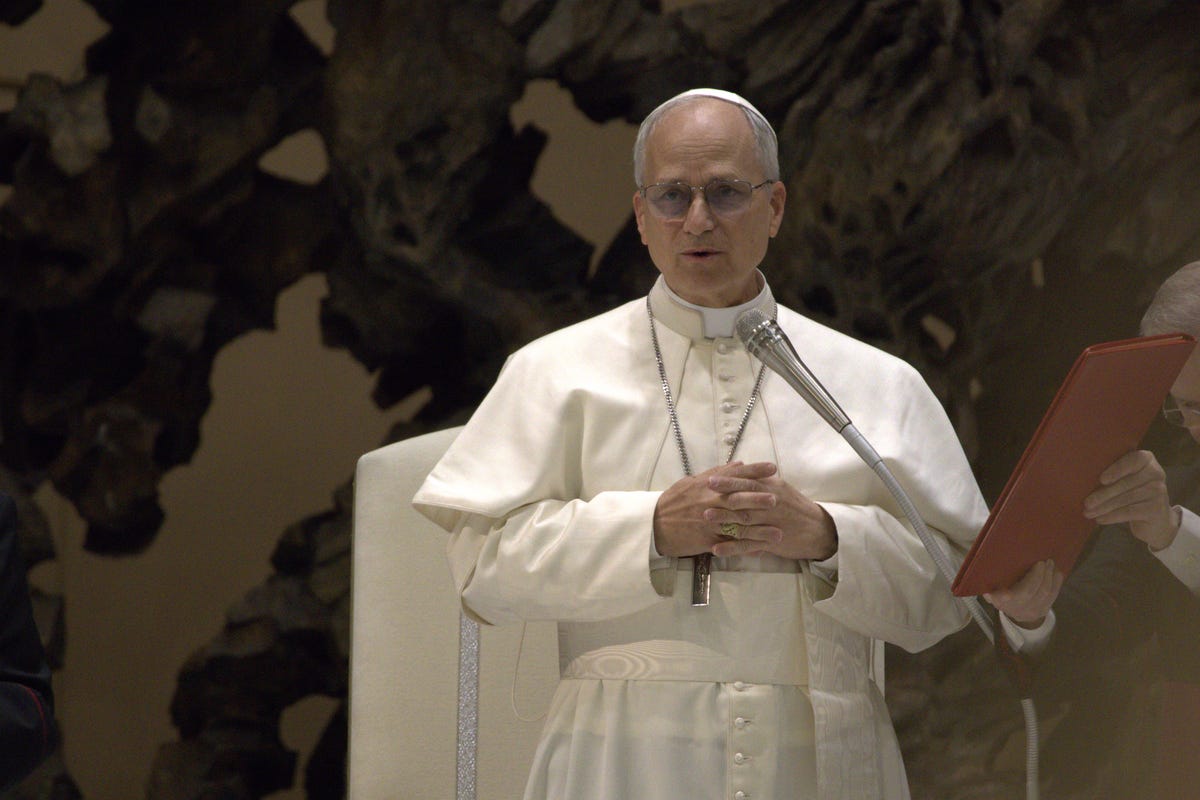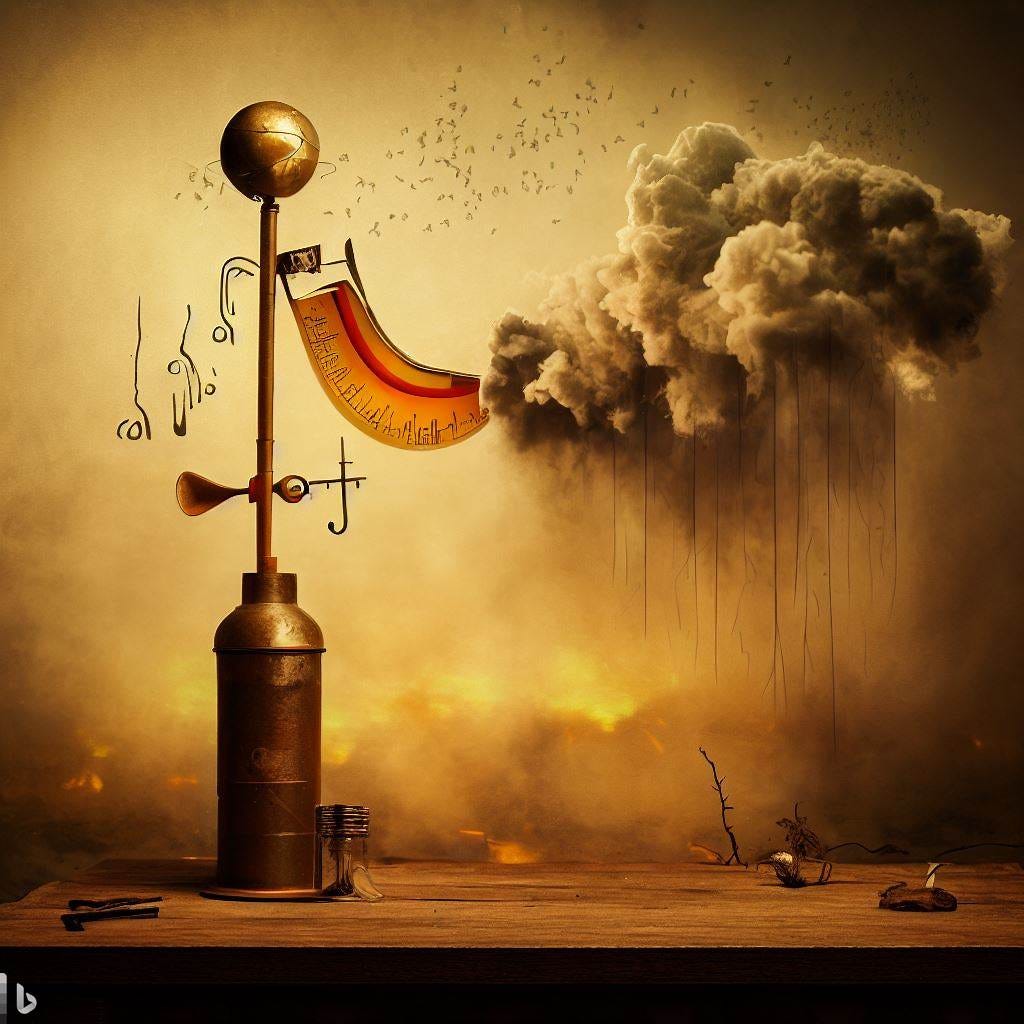Mind and Iron: The Pope Just Called Out AI. It Could Change Everything.
Oh, and Donald Trump rearranges the tech world order
Hi and welcome back to another spiky episode of Mind and Iron. I'm Steven Zeitchik, veteran of The Washington Post and Los Angeles Times, senior editor of tech and politics at The Hollywood Reporter and lead garnisher at this newsy baked-potato bar.
Every Thursday we bring you what's crucial at the nexus of business, science and technology, corporate spin unwelcome. Please consider joining our community.
Last week we told you that we may be out this week, but the news is too hot and the world too busy to take that dictum seriously. So we'll push our week off...off and get right to brass tacks today.
First, we were getting today's episode ready when word came that President Trump had signed a major deal with the United Arab Emirates to build an AI campus there, giving the country access to the United States' coveted chips. Here’s why it changes entire spheres of influence.
Also, while religion and AI has been a subject we've been thinking about for a while, we never thought for a second that one of the most important religious figures in the world would be thrusting it to the fore. How Pope Leo XIV accepted the pontificate with a warning about Silicon Valley — and why this is pretty great news for any of us concerned about humanity in our new age.
First, the future-world quote of the week:
“Developments in the field of artificial intelligence…pose new challenges for the defense of human dignity, justice and labor.
— The new Pope (!)
Let's get to the messy business of building the future.
IronSupplement
Everything you do — and don’t — need to know in future-world this week
The Pope may be an AI leader; How Donald Trump may have just reshaped the 21st century
1. WE'RE NOT SURE IF IT SAYS MORE ABOUT THE POPE'S HIPNESS or the tech's mainstreaming, but it was impossible not to bristle with energy when the newly coronated Leo XIV took special care to cite AI as something he hoped to usher in responsibly.
Just two days after his election, in his first speech to the Cardinals, the pontiff said AI was a core challenge he and the Church had to be prepared to meet. AI, Pope Leo said in his remarks, presents “new challenges for the defense of human dignity, justice and labor.”
In fact the tech was even the motivation for his name. The most recent papal Leo — the man born Gioacchino Pecci who became Leo XIII — served for a quarter century beginning in 1878, a time when the world had just been radically reshaped by industrialization. That Leo wrote an encyclical about unions, fair wages and safe working conditions, earning himself the sobriquet the "Pope of the Workers."
This Leo see his role as similar, hoping to steward a world beset by technological change to a most humane destination.
A couple of things stand out. For starters, it's pretty noteworthy that the issue is even at the fore of his mind. Too often tech is seen (by plenty of people far more engaged with it than a career clergy) as parallel to concerns of social justice and humanity, not bound up in it. It's a testament to the new pontiff's nuanced reading of our world that he sees them as indistinguishable. Technology issues are social issues, and the very fact that the pope sees responsible use of AI as no less important than peace in war zones or access to medicine in developing nations is remarkable all on its own.
For another thing, the pope didn't simply cite AI as a workers-rights issue. Certainly job displacement — the outsourcing to tech of jobs that could or in some cases should be done by humans — is a core concern here, as regular readers know. But as you M&I devotees also know, the issues AI pose go far beyond labor, to the very essence of our emotional, physical and spiritual lives — to our ability to center our humanity. Here, too, the pope seems to be catching the nuances in unusually sharp ways. Note how he sequenced the priorities: “for the defense of human dignity, justice and labor.” Human dignity first.
Finally there's the question of who he's turning his attention to. Like, literally. We think of popes as meeting world leaders on one hand or the sick and the poor on the other. But they can also encounter other social pillars — the scientists and business leaders who shape how we live. No word yet on what Pope Leo plans in this regard — no Sam Altman or Dario Amodei on the Vatican schedule right now. But the fact that the pope is talking this way suggests he's going to make meeting such folks a priority— is going to go out of his way to meet with the people who are shaping our society beyond the customary papal audiences. Pope Francis broke new ground meeting the likes of Tim Cook and Eric Schmidt. Don't be surprised if Pope Leo goes deeper down the tech-entrepreneur roster. (Hey he's already met Sinner. The other Sinner.)
The idea of a pope influencing the modern world is by now well established. In the 1980s Pope John Paul II helped platform worries about totalitarian Communist regimes and bring about their end. In the last dozen years Pope Francis did more than nearly any single individual in raising awareness and effecting action on the issue of climate change. Pope Leo will have his own legacy, and it may well be about responsible use of machine intelligence — in making sure we outsource less of our hearts, minds and souls than companies are interested in grabbing.
We are entering a period when machines will radically reorder our world as they haven’t in centuries, perhaps ever. These systems will be powerful, and getting them deployed in a humanity-elevating way won't be easy. We need that rarest of personalities who has the moral authority, technological sophistication and global clout if we hope to pull that off. This week, we just may have gotten him.
2. IN NORMAL TIMES, WE MIGHT GET ONE BIG PIECE OF AI NEWS OUT OF WASHINGTON every month. But these are not normal times.
Two major Trump AI moves have bracketed the news over the past seven days.
Last Friday, the president removed Shira Perlmutter, the head of the U.S. Copyright Office (working under the head of the Librarian of Congress who he also removed) just a day after she issued a warning that AI companies grabbing all these articles, books, films and songs for training data may not exactly be within the bounds of the law.
“Making commercial use of vast troves of copyrighted works to produce expressive content that competes with [content owners] in existing markets, especially where this is accomplished through illegal access, goes beyond established fair use boundaries,” her report said.
While Perlmutter's removal may not have a direct legal impact — the office only has a guiding effect on Congress and the courts — it certainly sends a signal to AI companies that Washington has their back.
As I wrote in The Hollywood Reporter this week, "Some activists warn that the Perlmutter firing could have an emboldening effect on tech companies eager to gobble up existing data. It could prompt the tech companies to negotiate more aggressively, they say — and reduce the leverage of media companies and other content owners."
Because, remember — even as OpenAI is fighting the NY Times and others in court over whether it has legal access to the work it's long been scooping up for training, it's also trying to buy rights to that work, justttt in case. And already has negotiated to do that with the AP, Axios, News Corp. and others. Negotiation is all about leverage. And Trump axing Perlmutter after she protected media companies just upped Big Tech's considerably. (There is some possibility the replacements may not turn out to be as Silicon Valley-friendly themselves, but that remains to be seen. We know, however, what Perlmutter was.)
A full six days went by with no major Trump AI news. Then Thursday came word of the bombshell United Arab Emirates deal. Basically what Trump did was promise to send massive amounts of chips to the UAE — hundreds of thousands from the U.S. giant Nvidia — so the Emiratis can build a giant data hub that will power AI apps across the region and beyond.

Under the terms of the "US-UAE AI Acceleration Partnership," in the wonderfully wonky phrase of the Commerce Dept., the UAE will now be Ground Zero for AI programs across Asia and Africa — all those apps will all be powered via the country — while an Emirati firm called G42 will get 100,000 of its own chips. (American companies will be getting the rest, though for use out of this UAE hub.) Nvidia chief Jensen Huang was even on hand at the UAE president's palace in Abu Dhabi on Thursday as the deal was announced.
There are two obvious inconsistencies here.
--The first is that the Trump administration has been engaging in a trade war with China and is of course worried (along with many U.S. economists) about China catching up to the U.S. on AI. Yet the UAE is very connected to China, with many Chinese expats living there and the two countries sharing a slew of diplomatic and cultural ties. China is also the UAE's largest trading partner. The Biden administration in fact limited the amount of chips that can be shipped abroad for precisely this China-centric reason. And now all these chips are going to a close Chinese ally.
--The second is that the Trump administration is currently just a littleeeee worried about American industries moving offshore. U.S. companies conducting their nitty gritty in foreign countries, depriving the U.S. of all those jobs, is all we've been hearing about for the past couple months. And that, to a tee, is what's happening here with one of our fastest-growing industries.
But Trump-administration inconsistencies are neither surprising nor, in this case, the crux of the issue. The crux of the issue is how a Gulf state that was about to see its power wane in the post-fossil fuel age is now seeing that power restored. The rare precious commodity that UAE (and Saudi, which also is getting a shipment of chips) has is oil. The commodity that will matter less in this electrified future is oil. No problem — now the Gulf states are rich in a precious commodity again, thanks to Trump and this deal.
The arrangement is the 21st-century equivalent of discovering huge oil wells in Texas and Alaska so America doesn't have to rely on foreign countries — and then going out and selling rights to those wells straight back to those countries. After decades of fighting for energy independence, it's a little weird to now create AI dependence, no matter how much money comes back in the process.
Now it's true that Gulf states can't manufacture these chips — Nvidia isn't becoming a UAE company. And it remains to be seen what controlling the data hub and a whole lot of chips could do -- the OpenAI's and Googles of the world still determine what programs get run and apps get built. But chips are a rare resource like any other, and they were just sold at market for some (very expensive) magic beans.
Finally, we might be tempted to see these two developments, the Perlmutter and the UAE deal, as separate. I don't think we should. Because at their root is the same mindset, and it's a risky one. What eliminating someone who was trying to put the brakes on giant tech companies grabbing all the content we produce achieves is jeopardize that content — it damages the ecosystems that make our country creative, informed, at the fore of the world, just so tech companies could make a lot of money.
Meanwhile, what the elimination of forces that put the brakes on giant tech companies selling all that they produce achieves is the flip side of that equation — it now not only leaves them unbothered to erode content but allows them to even more wildly profit off that erosion. After all, the only reason those chips are worth so much is because they can be used to process all that data.
Both developments are victories for Deregulated Tech, yes, but it's more than that — they're signs of a willingness to destroy what made America great, whether it's creative output or business superiority, all to make tech companies rich again.
The Mind and Iron Totally Scientific Apocalypse Score
Every week we bring you the TSAS — the TOTALLY SCIENTIFIC APOCALYPSE SCORE (tm). It’s a barometer of the biggest future-world news of the week, from a sink-to-our-doom -5 or -6 to a life-is-great +5 or +6 the other way. This year started on kind of a good note. But it’s been pretty rough since. This week? Tale of two cities.
THE POPE IS AN AI HUMANIST! And he’s not afraid to use his pulpit. +6.0
DONALD TRUMP JUST GREEN-FLAGGED BIG TECH, DAMN ANY OBSTACLES ON THE TRACK. Yikes. -5.0





